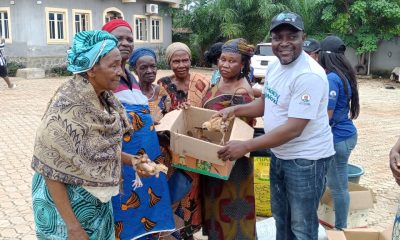NEWS
UNICEF Raises Concern over Covid-19-Induced Poverty in Homes

By Laide Akinboade, Abuja
United Nations Children Funds, UNICEF, on Thursday disclosed that over two-thirds of households with children have lost their means of livelihood since the COVID-19 pandemic hit two years ago.
In a statement issued by UNICEF, in Abuja and made available to journalists.
UNICEF disclosed that the finding was contained in a joint report with World Bank. The lost earnings it said, have left adults in one out four households with children going a day or more without food.
The statement reads: “The welfare of households with children – which presents findings from data collected in 35 countries, including Nigeria – notes that households with three or more children were most likely to have lost income, with more than three-quarters experiencing a reduction in earnings.
This compares to 68 percent of households with one or two children.“The report also notes that income losses have left adults in one in four households with children going without food for a day or more. Adults in nearly half of households with children reported skipping a meal due to a lack of money. Around a quarter of adults in households with or without children reported stopping working since the pandemic hit, the report says.
Sanjay Wijesekera, UNICEF Director of Programme Group, “The modest progress made in reducing child poverty in recent years risks being reversed in all parts of the world. Families have experienced loss at a staggering scale. While last year inflation reached its highest level in years, more than two thirds of households with children brought in less money. Families cannot afford food or essential health care services. They cannot afford housing. It is a dire picture, and the poorest households are being pushed even deeper in poverty”.
The report finds that children are being deprived of the basics, with children in 40 percent of households not engaging in any form of educational activities while their schools were closed. Given that data is compiled at the household level, the actual participation rate at individual level is likely even lower, especially for children who come from households with three or more children.
Carolina Sánchez-Páramo, Global Director of Poverty and Equity for the World Bank said,
“The disruptions to education and health care for children, coupled with catastrophic out-of-pocket health expenses which affect more than one billion people, could put the brakes on the development of human capital – the levels of education, health and well-being people need to become productive members of society,.
“This could lock in increases in inequality for generations to come, making it less likely that children will do better than their parents or grandparents.”
While households with three or more children were the most likely to experience a loss of income, they were also most likely to receive government assistance, with 25 percent accessing this support, compared to 10 percent of households with no children. The report notes that this helped to mitigate the adverse impact of the crisis on households who received support.
The report further notes that prior to COVID-19, one in six children worldwide – 356 million – experienced extreme poverty, where household members struggled to survive on less than $1.90 a day. More than 40 percent of children lived in moderate poverty. And nearly 1 billion children lived in multidimensional poverty in developing countries, a figure that has since increased by 10 percent as a result of the pandemic.
UNICEF and the World Bank urge a rapid expansion of social protection systems for children and their families. Support including the delivery of cash transfers and the universalization of child benefits are critical investments that can help lift families out of economic distress and help them prepare for future shocks. Since the start of the pandemic, more than 200 countries or territories have introduced thousands of social protection measures, and the World Bank has supported countries with approximately $12.5 billion to implement such measures, reaching nearly 1 billion individuals worldwide.
NEWS
Nigeria Customs Service Foils Smuggling Attempts, intercepted PMS worth over 95 million in Adamawa.

From Yagana Ali Yola
The Nigeria Customs Service, Zone D, Adamawa State, has made significant seizures of petroleum products and arrested suspects in various smuggling operations.
The seizures include 2,276 jerricans of Premium Motor Spirit (PMS) and 19 jerricans of Automotive Gas Oil (AGO), with a total Duty Paid Value (DPV) of ₦95,695,000.
The controller general of custom Bashir Adewale Adeniyi , who was represented by the commander operations whirlwind
HK Ejibunu said the smuggling operations were intercepted at various notorious smuggling flashpoints, including Malabu-Belel Axis, Girei-Wuro Bokki Axis, Gurin-Fufore Axis, Jamtari Axis, Maiha Axis, Jimeta Waterside, and Mubi-Sahuda Axis.
The petroleum products were carefully concealed and being prepared for illegal export or distribution to neighboring countries.
Earlier in his welcome address the controller Nigeria custom Adamawa/ Taraba command HB Bashir call on good people of Adamawa state to cooperate with the command in other to bring to an end the activity of the Economics saboteurs who snuggled PMS to the neighboring country of Cameron at detriment of Nigerian.
However, the Nigeria Customs Service reported a disturbing incident of a violent mob attack on its operatives while on duty. The officers were ambushed by violent mobs and smugglers who barricaded access roads and assaulted the officers. One of the attackers was fatally injured during the chaos.
The smuggling of PMS not only results in revenue loss for the country but also puts additional pressure on the already strained fuel supply chain. The Nigeria Customs Service is committed to curbing such illicit activities that threaten national security.
The Service is working with relevant security agencies to identify and bring all perpetrators to justice. The public is urged to support law enforcement activities by providing timely intelligence and standing against such wicked acts and criminalities.
The Nigeria Customs Service remains committed to its mission of protecting the nation’s borders and preventing economic sabotage. The Service condemns the violent attack on its operatives and reiterates its zero-tolerance stance toward violence and obstruction of official duty.
| ReplyReply allForwardAdd reaction |
NEWS
Group Empowers Women in 12 Akwanga Communities with Poultry Items.

From Abel Zwanke, Lafia
As part of its ongoing efforts to promote grassroots entrepreneurship and self-reliance, the Community Initiative for Character Moulding and Entrepreneurship Development (CiCMED), under its Future Planter Happy World Project, has empowered women in 12 communities across Akwanga Local Government Area of Nasarawa State with poultry starter kits.
The one-day community engagement, themed “Building Self-sufficiency and a Brighter Future for Nigerian Mothers and Children (Happy World),” was designed to equip rural women with the resources needed to establish and sustain small-scale poultry farming ventures.
Beneficiaries received 240 Nuellas (pullet chicks), poultry drinkers and feeders, and bags of chicken feed to aid their startups.
Speaking during the one Day distribution exercise on Wednesday, the programme coordinator, Mr. Kefas Tigga, said the empowerment was a deliberate effort to build economic resilience among women, particularly in underserved communities.
“This project is a response to the need for sustainable empowerment. We believe that by equipping women with these poultry items, they can generate income, support their families, and contribute meaningfully to local food production,” Tigga stated.
He acknowledged the vital support of Rt. Hon. Musa Ahmed Mohammed, the Nasarawa State Accountant General, who also holds the traditional title of Baraden Nasarawa, for his unwavering commitment to community development.
“We’re grateful to Rt. Hon. Musa Ahmed Mohammed, the Nasarawa State Accountant General, for his continued support for initiatives that promote economic growth and social impact at the grassroots,” he added.
One of the beneficiaries, Mrs. Amina Adamu, expressed her gratitude, describing the project as a life-changing intervention.
“This is the kind of support we need. With these birds and feeds, I can start something immediately. I’m very grateful,” she said.
CiCMED reaffirmed its dedication to closely monitoring the beneficiaries’ progress and pledged to extend the Future Planter Happy World Project to more communities across the state.
NEWS
Hepatitis: FCTA Screens Food Handlers

By Laide Akinboade, Abuja
In order to safeguard public health and food security in the Federal Capital Territory (FCT), the FCT Administration (FCTA) will soon commence a comprehensive hepatitis screening of food handlers, especially those working in restaurants, markets, bakeries, canteens.
The initiative is aimed at preventing hepatitis and other foodborne diseases, thereby protecting public health and empowering food businesses to operate with enhanced confidence and credibility.
This was contained in the FCT Minister, Nyesom Wike’s goodwill message, marking the World Hepatitis Day 2025.
The goodwill message delivered on behalf of the Minister by the Mandate Secretary, Health Services and Environment Secretariat, Dr Adedolapo Fasawe, reads in part, “Hepatitis A and E, primarily transmitted through contaminated food and water, can rapidly spread through poor hygiene practices, posing serious risks in our rapidly expanding and cosmopolitan city of Abuja.
“Furthermore, Hepatitis B and C, predominantly spread through blood and bodily fluids, still pose a risk in food environments where open wounds or poor hygiene are present.”
The FCT Minister described food handlers as an overlooked group whose role is pivotal in safeguarding public health.
“Therefore, the FCT Administration, committed to safeguarding public health and food security, is launching a strategic initiative to enhance food safety through comprehensive hepatitis screening of food handlers. This ambitious initiative is being scaled up through an innovative Public-Private Partnership (PPP) consortium, in alignment with the National Policy on Food Safety and Quality.
“This PPP consortium will combine efficiency, technical expertise, and funding capacity of the private sector with government oversight to implement regular and mandatory Hepatitis B and C screening for all food handlers within the FCT
“We urge all stakeholders, government agencies, private enterprises, healthcare providers, and food industry operators to actively support this transformative initiative through the mandatory hepatitis screenings for food handlers, promotion of free and effective Hepatitis B vaccination at public health facilities, enforcement of standardized food safety training inclusive of hepatitis awareness, rigorous enforcement of licensing, hygiene inspections, and medical screening requirements for food vendors and handlers and raising awareness and compassionately addressing the stigma surrounding hepatitis.
“To us, food handlers are not just service providers, they are essential public health stewards. Simple, consistent, and safe hygiene practices can significantly reduce hepatitis transmission.
“Therefore, let us break the silence. Hygiene cannot wait. Screening cannot wait. Action cannot wait. Together, let’s ensure that the FCT leads by example, turning our food industry into a symbol of health, safety, and excellence.”
| ReplyReply allForwardAdd reaction |




























